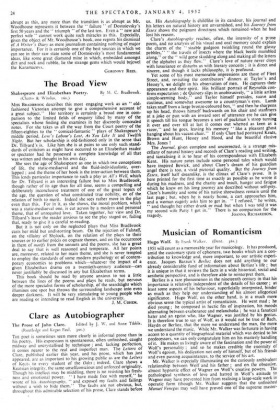The Broad View
Shakespeare and Elizabethan Poetry. By M. C. Bradbrook.
(Chatto & Windus. 16s.)
MISS BR ADBROOK describes this most engaging work as an " old- fashioned Victorian attempt to give a comprehensive account -1)f a great subject." Her territory is certainly a broad one in com- parison to the limited fields of enquiry tilled by many of the specialists whose finding she examines in her discreetly concealed notes. For she takes us all the way from the Court poetry of the fifteen-eighties to the " comical-fantastic " plays of Shakespeare's middle period, Love's Labour's Lost, As You Like It and Twelfth Night. But her scholarship is old-fashioned only in the sense that Dr. Tillyard's is. Like him she is at pains to use only such stand- dards of criticism as might have occurred to an Elizabethan reader or spectator had he possessed a complete knowledge of all that was written and thought in his own day.
She sees the age of Shakespeare as one in which two conceptions of life, the static-mediaeval and the fluid-individualistic, over- lapped ; and the theme of her book is the inter-action between them. This lends particular importance to such a play as All's Well, which for Dr. Tillyard is an interesting failure but to Miss Bradbrook, though rather of its age than for all time, seems a compelling and deliberately inconclusive treatment of one of the great 'topics of the age, the question of what constituted- true nobility, or of the relation of birth to merit. Indeed she sees rather more in the play even than this. For in-it, as she shows, the moral problem, which was a static-mediaeval one, is cut across by a modern and personal theme, that of unrequited love. Taken together, her view and Dr. Tillyard's leave the reader anxious to see the play staged or, failing that, ready to give it a careful re-reading.
But it is not only on the neglected plays that Miss Bradbrook casts her mild but undistorting beam. On the rejection of Falstaff, on the villainy of Shylock, on the relation of the plays to their sources or to earlier precis on cognate themes, and on the occurrence in them of motifs from the sonnets and the poems, she has a great deal to say that is well reasoned and temperate. All her points are, moreover, related to her main theme, and she is never tempted to employ the standards of some modern psychology or of contem- porary economics to problems which—whatever the impact of a given Elizabethan drama on a twentieth-century audience—can never justifiably be discussed in any but Elizabethan terms.
This book should be read by anyone anxious to see a little between the lines of the poems and plays he reads, but nervous of the more specialist forms of scholarship, of the searchlight which illumines one spot but throws the surrounding landscape into even deeper darkness. It will be very stimulating to young people who are reading or intending to read English in the university.
J. M. COHEN. J. M. COHEN.






































 Previous page
Previous page